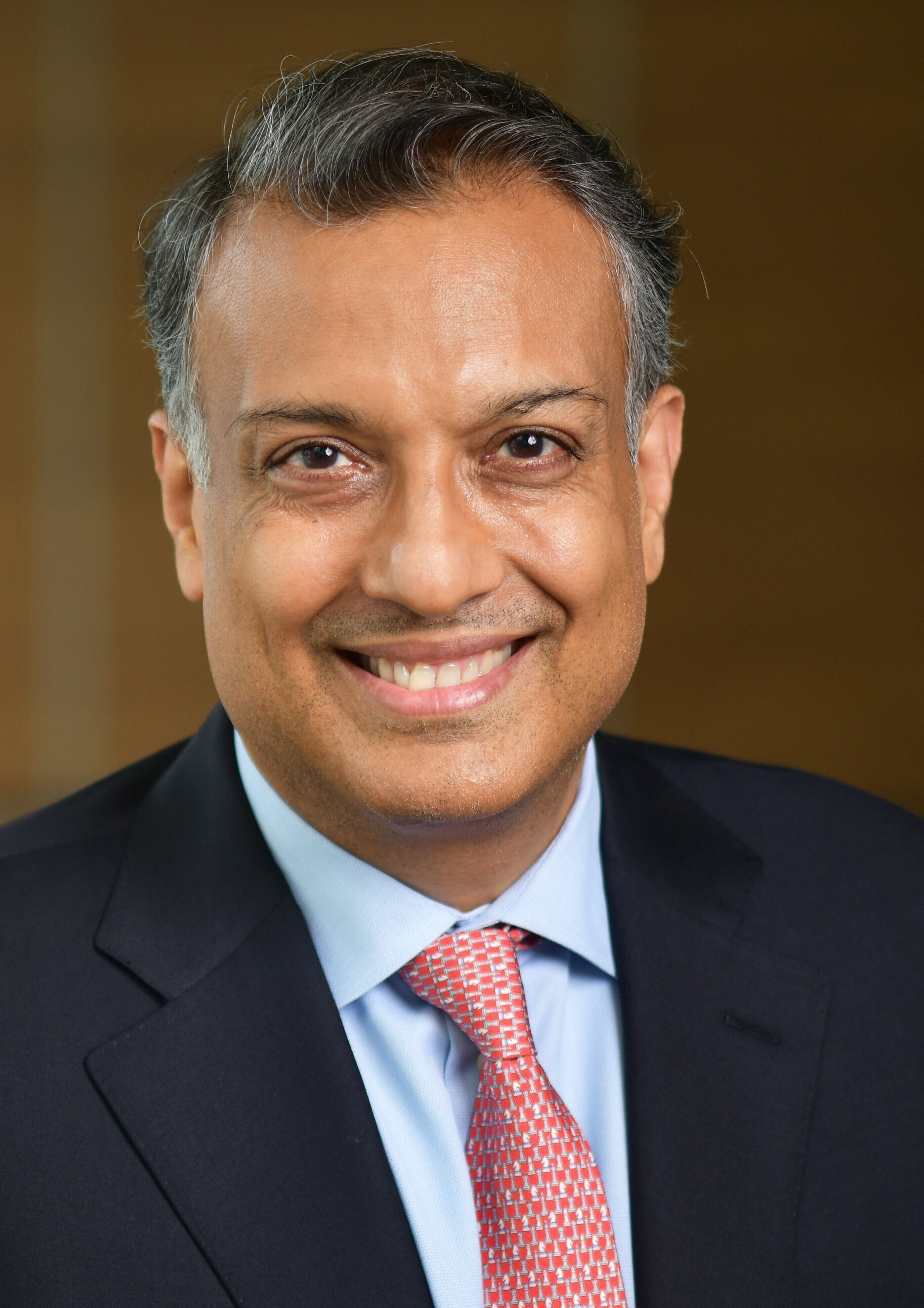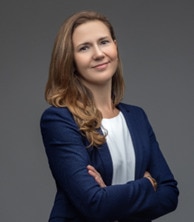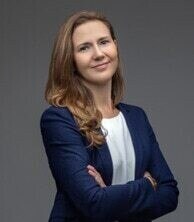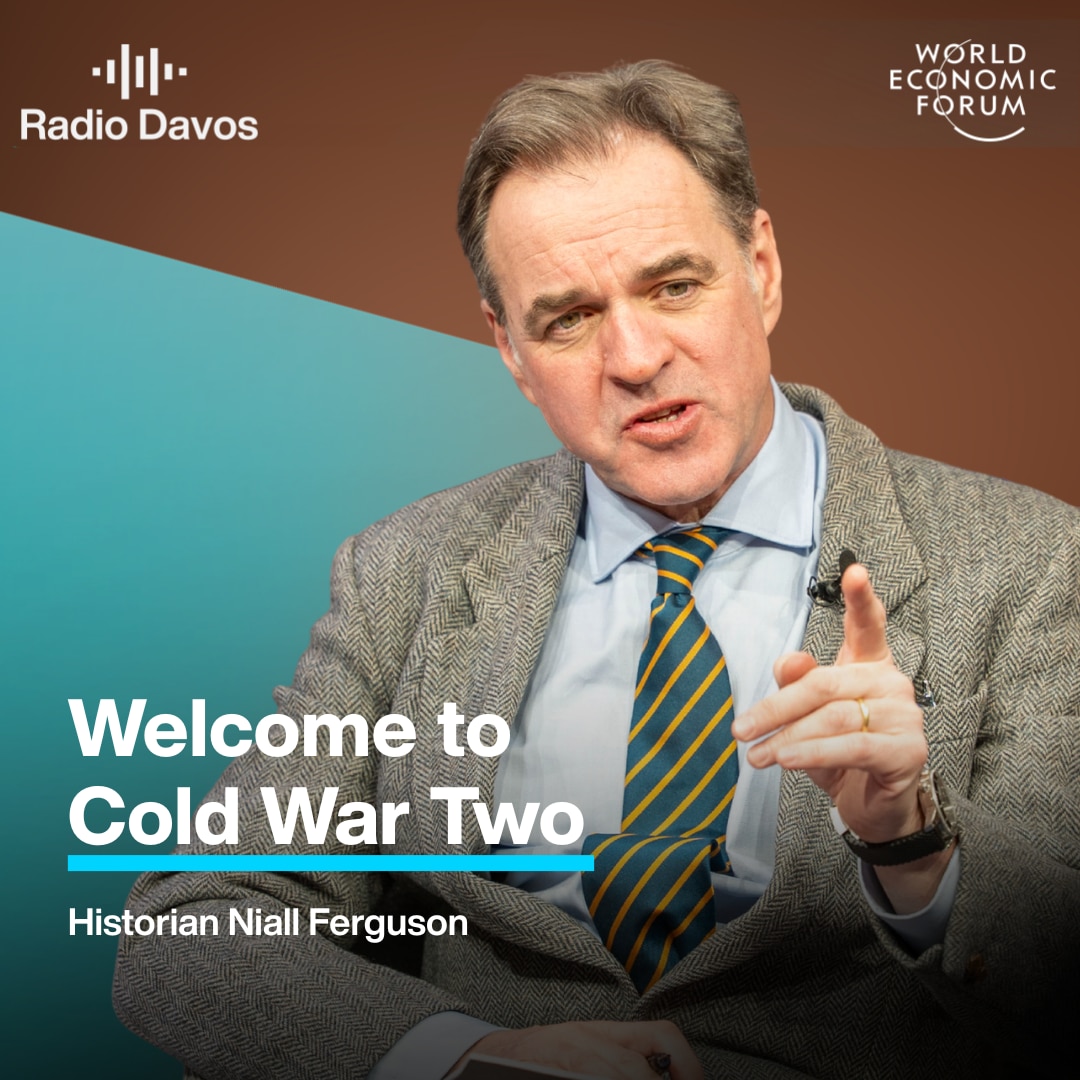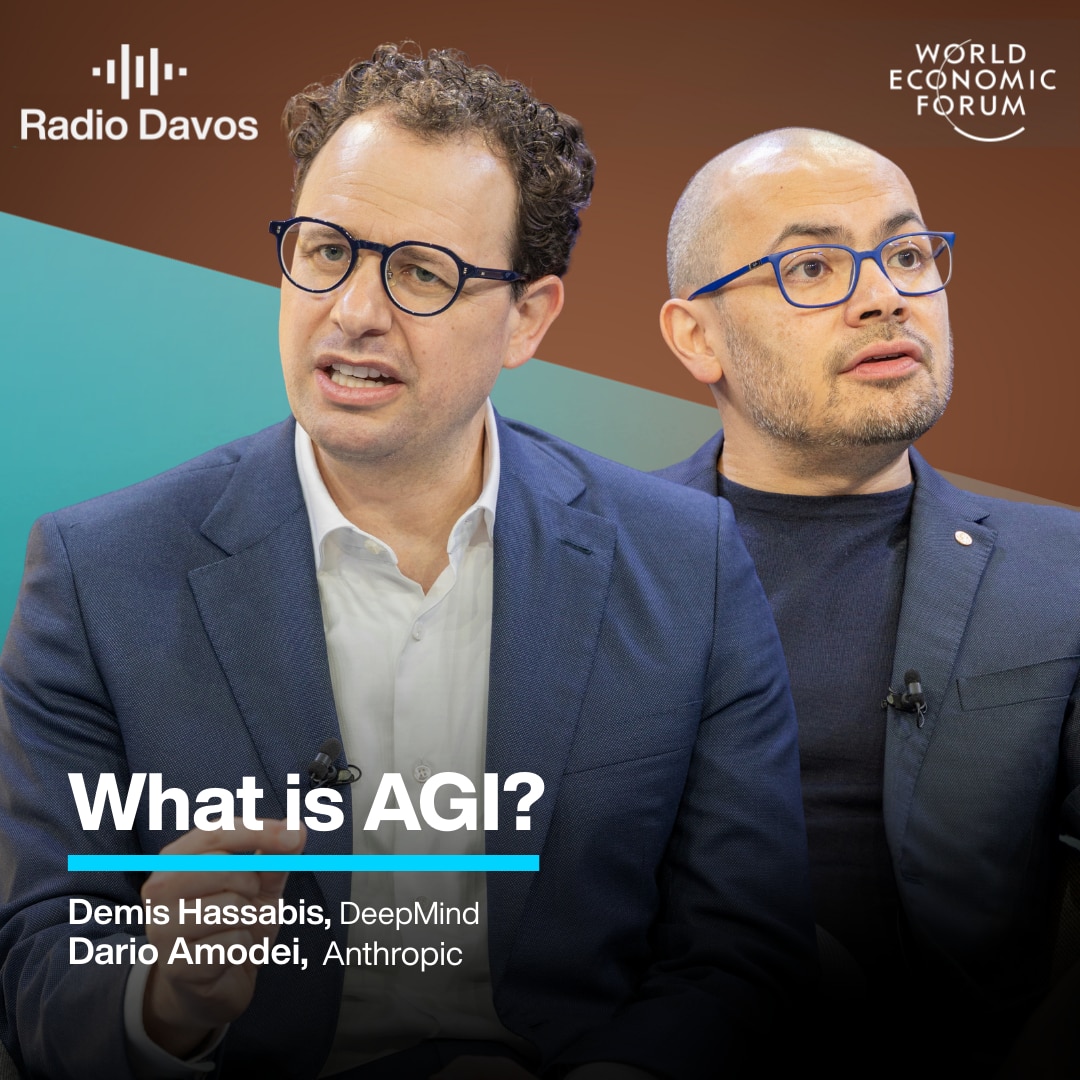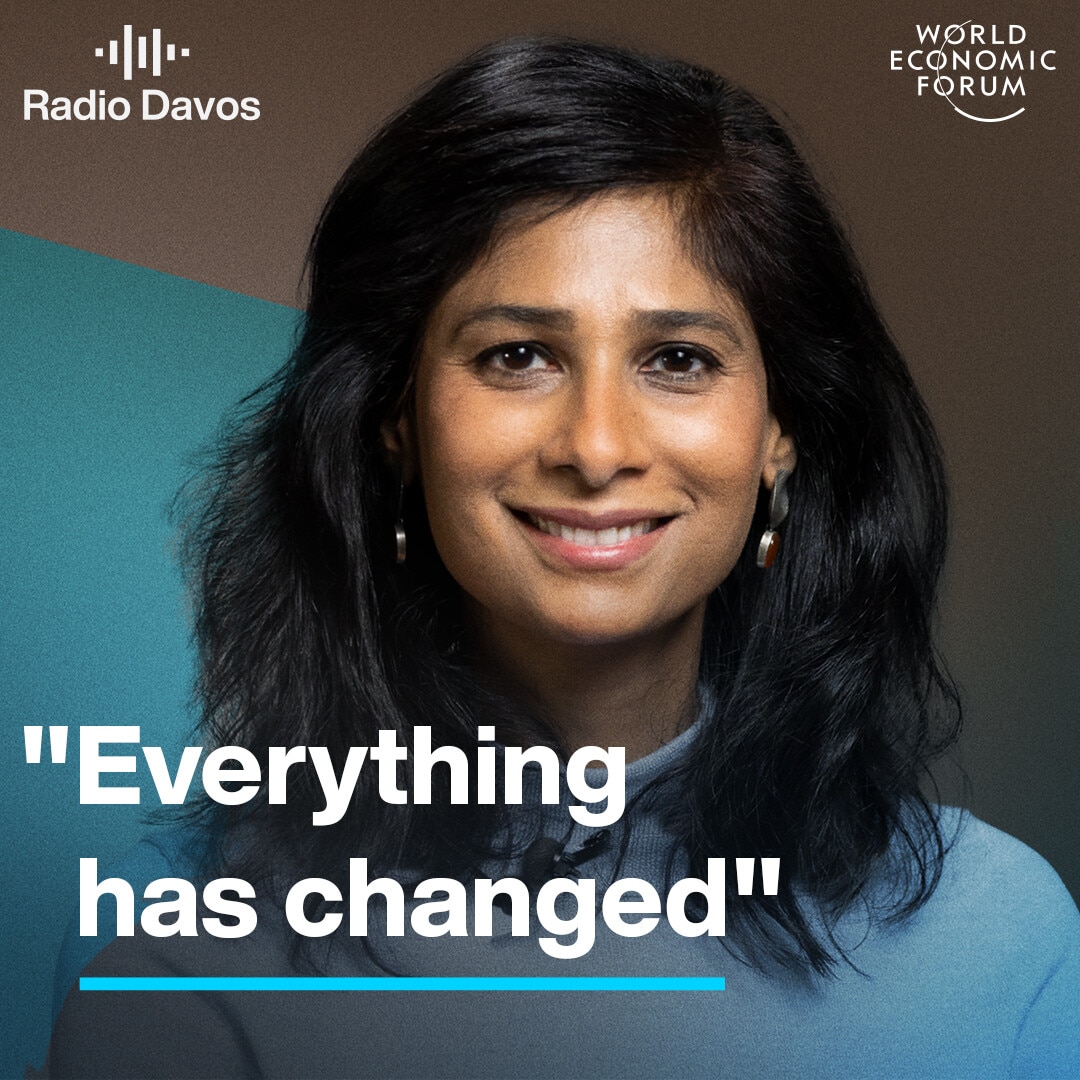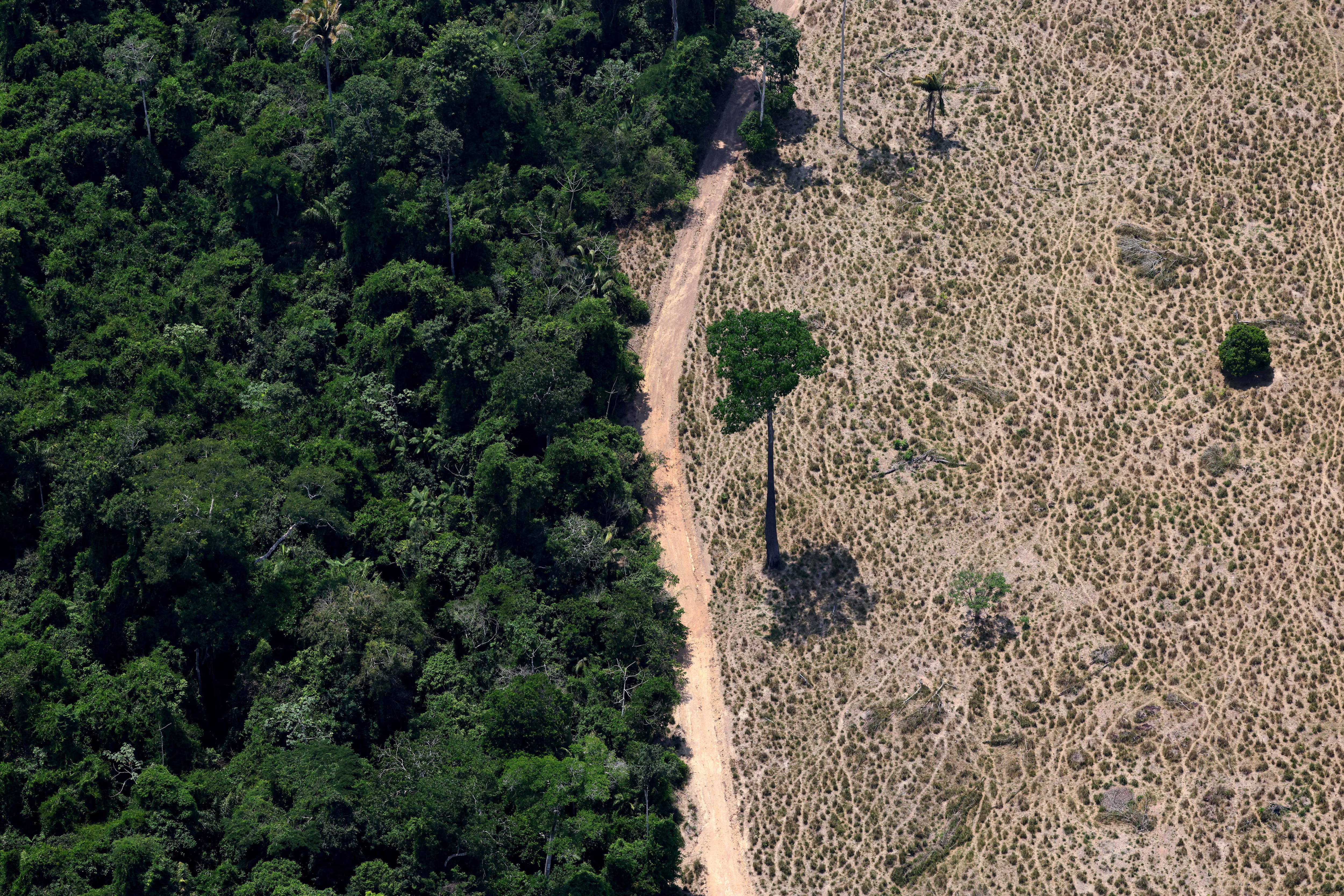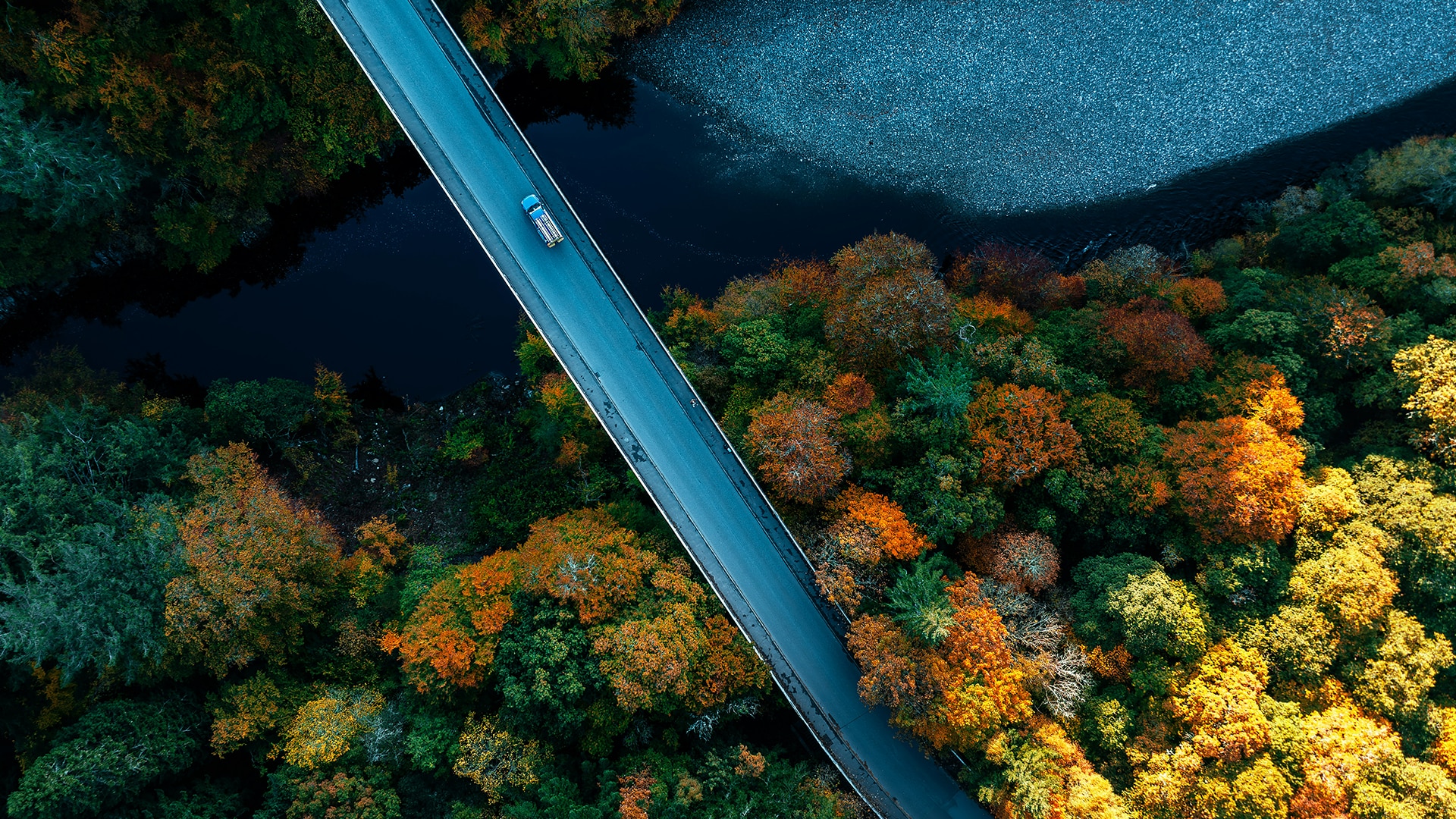Climate science is clearer than ever. How should companies respond?
播客文字稿
This transcript has been generated using speech recognition software and may contain errors. Please check its accuracy against the audio.
Johan Rockström: 2024. We, for the first time, experienced 1.5 degrees Celsius. It cost the global economy over 200 billion US dollars in all the droughts, floods, heat waves, fires, disease outbreaks.
Robin Pomeroy: Welcome to Radio Davos, the podcast from the World Economic Forum that looks at the biggest challenges and how we might tackle them. This week we are returning to one of the biggest challenges, climate change.
Pim Valdre: What we're seeing at the global level ambiguity in the policy space and sort of a retreat on ambitious decarbonisation policies. But at the same time we're seeing the increased physical impact of climate.
Sumant Sinha: If a large part of some of the biggest economies of the world start looking in some other direction, and start only focusing on profit maximization, but not looking at the carbon side at all and climate change at all, then that's obviously going to weaken the whole effort.
Johan Rockström: A science aligned pathway is the winning pathway for the future.
Sumant Sinha: This is a massive, massive business opportunity for companies that choose to change their own pathway going forward, this can be actually a big differentiator for them.
Robin Pomeroy: In this episode we have two great guests to talk about climate science, climate policy and the business response to all of that. And I'm joined by a co-host this week, my colleague Pim Valdre. Pim, how are you?
Pim Valdre: Very good. Thank you.
Robin Pomeroy: What do you do at the World Economic Forum?
Pim Valdre: So I head or co-head our climate work. And in that role, I have the pleasure to also lead the secretariat of the Alliance of CEO Climate Leaders, which is a global coalition of 130 companies across 12 sectors and 27 countries.
And we essentially do three things with these companies. We help them accelerate emission reduction and mitigation action. Really looking at the value chain emission reduction, which are this sort of notorious reduction that can stand for about 85% of corporate emissions, GHG emissions.
We also work to increase business leadership on climate resilience and adaptation. And how do we embed climate risk into corporate decision-making and strategy to make sure that we deliver value, not only to shareholders, but to society as a whole.
And thirdly, we catalyze public-private collaboration. Many of the knock-on effects of the climate crisis, if we look at food price inflation, higher insurance premiums or infrastructure upgrades that will be needed, it's a public-private problem and challenge, and it needs a public-private solution rooted in science.
And that's why we're so thrilled today, really, to introduce two of our speakers. The first is Professor Johan Rockström, who is the director of the Potsdam Institute for Climate Impact Research, who has pioneered the concept of planetary boundaries framework. And we'll talk a little bit to you about the state of science.
And also Sumant Sinha, who's the chairman and chief executive officer of Renew and one of India's largest renewable energy companies. And he's also the co-chair of the Alliance of CEO Climate Leaders. I think over to you, Robin, to kick us off.
Robin Pomeroy: Thanks, Pim. Great to meet you both. Let's start with the science. We have Johan Rockström. Tell us, where does the science stand now?
We've been thinking about climate change for a couple of generations now. This is not a new thing. And isn't it interesting to hear there are still climate sceptics? Is it still in the balance whether climate change is happening, whether humans are responsible for it happening? And what the remedies need to be? What do we know from science right now?
Johan Rockström: Yes, thanks, Robin, and great to be with you. Good to see you, Pim, as well.
And well, science is standing more firmly than ever before. Remember that climate science has more than a century under its belt since Svante Arrhenius in the late 19th century postulated the first calculations of how greenhouse gasses warm the planet because of returning, or the energy imbalance caused by more heat being trapped under the greenhouse gasses than is released back into space.
And this is now, since many decades, so well established that I would argue that it's as established as the fact that we all accept that if you drop your mobile phone, it falls to the floor because of something called gravity.
So, it's as firmly and evidence-based, unequivocally established that greenhouse gasses causes global warming, which impacts on climate, triggering extreme events and shifting the entire heat balance on Earth, which changes hydrology and freshwater supply. It causes heat waves, it changes ecology, and it fundamentally undermines what we call life support for humanity or the basis for the global economy, namely the stability of the environmental systems that we all depend on, everything from sea levels to forest systems to soils.
So that is where the science stands. But to your question where we are today, if you just look at the last two-three years, we are, unfortunately, scientifically forced to raise our concerns to an even higher level than the basic level that we have been standing on firmly for six IPCC, Intergovernmental Panel on Climate Change, reports, which is the fundament upon which the entire climate science community stands on, which has led to the conclusion that we will have a global climate crisis.
But just over the past two-three years, we see something very worrying from the observations, namely a tendency of accelerated warming.
So we have a situation where we have been warning scientifically for decades that more greenhouse gasses and fossil fuel burning leads linearly to more temperature rise - and we reached up close to 1.5 degrees Celsius of global mean surface temperature rise. And remember, we also know today with high degree of certainty, the warmest temperature on Earth over the past 100,000 years, since we left the last ice age 18,000 years ago, we've never seen, not only temperatures at this level that we experience right as we speak, but we've never seen the rate of warming as we see right now.
But also, over the past decade, we see this accelerated rate of warming, meaning that, unexpectedly, the rate of warming seems to go faster than we had expected. And the reason for this is not absolutely, it's not well, let's say, teased out statistically yet, but we know the candidates.
We know it is a combination of, for sure, natural variability like solar cycles and El Niño events, but also changes in air pollution, changes in hydrology and cloud dynamics, and changes in the carbon uptake capacity in nature, meaning how much carbon is taken up in the ocean and carbon taken up in forest systems.
So the conclusion right as we meet today is that not only do we have a climate crisis on our watch, not only is it very, very well scientifically established - I mean, I would say there's no discussion scientifically - we also see the first signs of a potential crack in the resilience of the planet. That the planet may be giving its first signs of weakening its capacity to buffer this stress caused by the human energy imbalance from fossil fuel burning and ecosystem change.
So, you know, if you ask me and if you asked the scientific community, are we worried? The answer is yes.
Pim Valdre: Thank you, Johan. I recall you saying that 1.5 isn't a political construct, it's a vital physical threshold for keeping our planet safe, and that every fraction of a degree matters. Can you share a little bit more about that, particularly on every fraction of a degree matters? Why is it so?
Johan Rockström: The first thing which actually disappoints me quite significantly is that we have failed, and I'm very self-critical here, we have failed to communicate the scientific evidence, to put it very simple, that 1.5 degrees Celsius of global mean surface temperature rise is a big number. It's not something you negotiate with, it's not an aspiration, it is not a target, it's not a goal. It's a limit.
Scientific evidence is ample here. We've recently published a scientific paper showing that five large biophysical so-called tipping point systems are likely to irreversibly shift from the stable state that we depend on to move irreversible on a journey away from that state, which will amplify warming even more, if we pass 1.5 degrees Celsius.
And just think of the list. The Greenland Ice Sheet, the West Antarctic Ice Sheet. Abrupt thawing of permafrost up in the Arctic zone. Collapse of all the tropical coral reef systems - I mean, here we're talking livelihoods of 200 to 400 million people across the world - and collapse of the Barents Sea ice.
Just those two ice sheets, the Greenland Ice Sheet and the West Antarctic Ice Sheet, represent 10 metres sea level rise.
So this is what science says, go beyond 1.5 permanently, and we risk causing this irreversible damage and, and even amplify the rate of warming.
So 1.5 is something we need to take very seriously and we should do everything we can to, to hold ourselves under 1. 5.
Now the dilemma is that we are unavoidably going to breach 1.5 because, 2024, we, for the first time, experienced 1. 5 degrees Celsius, actually went up to 1. 55. It cost the global economy over US$200 billion in all the droughts, floods, heatwaves, fires, disease outbreaks.
The IPCC projections - the Intergovernmental Panel on Climate Change - projects that by 2030-2035, we are very likely going to breach 1.5 more permanently, because scientifically we define global mean surface temperature as the moving 10-year average. So 2024 was a taste of the future, but it wasn't a permanent breaching.
Now, the best scenarios to solve the climate crisis is that we breach 1.5 but can still come back to 1.5. So we definitely need to hold 1.5 still alive, but it will take us many decades - three, four decades - and that we will have an overshoot period before we can come back.
And we come back only if we phase out fossil fuels, as has been agreed in the Dubai statement of accelerating and starting the transition away from fossil fuels. But also that we need to come back into the planetary boundaries on protecting nature's capacity to be carbon sinks.
Now, during that overshoot period, which we are very likely heading towards, and we are likely heading toward it very soon, we may risk to come up to 1.7 degrees Celsius of global mean surface temperature.
Now, we know with 100% certainty, zero uncertainty, that that will lead to more extreme events, more damage, more loss and damage to people across the world. More threats to the value chains of the economy, even impacts on inflation, because so large part of the economic baskets of consumption is, after all, food. And food is the first victim of extreme events.
Now, therefore, scientifically, we can say that every 10th of a degree matters - keeping that overshoot to a minimum. 1.6 is more manageable than 1.7. And again, remember that we're talking mean temperatures here. It might seem a little to talk of a 10th of a degree, but a 10th of a degree of average temperature on planet Earth is what translates to extreme weather events.
When Sumant shared with us that you're sitting at a 41 degree Celsius position right now, well, a 0.1 to 0.2 degree Celsius change in global mean surface temperature can lead to massive throws of 5, 10 degrees Celsius in regional weather extremes, which is why we already at 1.5, for example, last year, experienced many locations in the world that had over 50 degrees Celsius of heat waves, like for example during the pilgrimage to El Hajj last year with over 1,000 deaths.
So small, small changes in mean temperature leads to massive volatility and extremes in local impacts across the world.
Robin Pomeroy: You talk about the communication challenge that people haven't really understood that message. And perhaps you've put your finger on it there, 1.5 degrees, if it's suddenly 1. 5 degrees warmer outside, doesn't make that much difference. But you've said it there that actually that's the mean across the world. It can locally mean huge changes to the local weather.
And you mentioned Sumant, who's dialing in from Delhi. Hi, Sumant. Sorry it's taken so long to get to you. Just before we started recording, you told us it's 41 degrees outside. I mean, Delhi's a hot city, right? So nothing unusual there, I suppose. But what do people in India, you know, I'm talking about companies, but also just normal people think about climate change. Is it something that gets discussed? We've all got other things to worry about. You know, our jobs, our families, the politics going on around us. But is climate change something that Indians really talk about?
Sumant Sinha: Yeah, hi Robin, hi Pim and hi Johan.
It was fascinating listening to Johan talk about where we are right now from a science standpoint and it's really alarming. It's really actually quite scary and what is actually scarier in a way, Robin, is the fact that a large part of the world seems to be disregarding the scientific evidence right now and is acting as if there's nothing happening around us.
And so that really worries me because the question then becomes you know, are we going to be able to do enough to deal with this problem? And clearly the answer to that question right now is no.
But my worry is that, from the folks that deny climate change right now, it should not spread to the rest of the world.
And you asked about India. In India, the situation essentially on climate change is that the folks in the government, fundamentally believe in climate change, that it is happening and therefore, and that India will be one of the most vulnerable countries on account of climate change issues.
We have a large part of our population in the coastal areas. You know, we are very reliant on the monsoon rains for our crop output. We obviously don't have a very high per capita GDP. So a lot of people are dependent on agriculture. So, any changes in weather patterns will have enormously serious consequences on India as a country.
And so the Indian government clearly recognizes and understands that and therefore is doing whatever we can at our end as a country to deal with climate change issues.
And that's frankly, over the last 10 years, there's been a very significant change in our stance on this issue. Until I think the time before that, India's position has been that. Look, we didn't cause climate change to happen, so the folks who actually caused climate change to happen are the ones who should actually fix it. And if you look at the per capita emissions of India on carbon emissions, it's actually very, very low.
And so therefore that had been India's position, but I think it's changed, as I said, to a point where we are now saying, okay, look, it may not have been our fault, but we are going to be equally impacted or more impacted, and therefore we need to whatever we can from our side help address this problem.
And that is why the government is a very keen participant in all the COPs. There are various indices that we've announced that are fairly, I would say, mature coming from India. And very significant targets have been set to decrease fossil fuel consumption, certainly in the electricity sector.
There is an attempt being made to do the same on the broader energy area through things like green hydrogen and so on, there's the active development of a carbon market that is taking place so that we can try to limit carbon emissions within the country.
So a lot of work is going on on some of those areas and I'm happy to talk about what those are in more detail as we go forward.
I think as far as the broader population is concerned, there is clearly an awareness that climate change is an issue, but I think the bigger issue for India right now is pollution, especially in northern India, and especially during the winter months, when it becomes really bad. And that's really where the pollution issue and the climate change issue sort of get intertwined and intermixed.
And the fact is that we know that we have to solve the pollution problem as well. And because it hits the common man and the common person, and it leads to all sorts of health issues and other kinds of issues. I think that has really made people a lot more aware of the whole issue around pollution and climate change. And so I think within the ordinary sort of citizen of the country as well, there is clearly an understanding of the fact that these twin issues need to be tackled and addressed as well.
So I would say there's broad-based support. And I think what India is trying to do as a country is to find solutions that are not economically costly. And if we can help do that, then perhaps we can show or become an example to the rest of the world to demonstrate that a less carbon emissions intensive way of economic growth actually makes economic sense.
And so there are various things that are going on.
Now, one of the interesting data points that I heard recently was that last year energy growth globally was about close to about 3% which is actually quite high Because normally it's been at about 1% or even flat the Western world has been flat for many years India has been going at about four to five percent energy growth and China's probably somewhere between the two. Last year the global growth in energy demand was about 3 percent But the interesting thing is that half of that energy demand came from increased cooling requirements
So what is now happening is, to Johan's point about tipping points, we get into a point where the higher temperatures are requiring higher energy consumption, which will therefore lead to more carbon emissions if we don't change the way we generate energy. And that in turn will lead to more temperature change, will lead then to more carbon.
So we're getting into this vicious circle that is going to feed in on itself and is going to really just lead to a much faster change to the points that Johan was talking about. And I think that is something that we need to also address.
So there are a lot of these interdependencies that are now playing out which we don't fully understand, which we can understand only in sort of retrospective analysis, and I think all of those are really, really quite scary because they do lead to, I think, consequences that we don t fully understand yet.
Robin Pomeroy: Pim, do you have a question for Sumant?
Pim Valdre: Yeah, thanks, Sumant. I want to come back to your point on the economic case. In addition to being the CEO of Renew, you're also co-chair of the Alliance of Social Climate Leaders. And if we look at that whole coalition of 130 companies, we were able to deliver 10% aggregate absolute emissions reductions since we started measuring the baseline of this coalition in 2019, while also delivering, within the companies of this coalition, an 18% aggregate revenue growth.
So that really shows that there's no contradiction really between positive climate action, economic performance. Actually in many cases, climate smart is business smart really. It's just sound, good business strategy and practice. How do you review that argument in today's shifting world?
Sumant Sinha: Well, you know, there are different facets to that, and if I just look at it purely from an energy context to start with, I think that in electricity, we know that there are solutions that are available that are cheaper than buying fossil fuel based energy sources, right?
So if you buy solar energy or wind energy, depending on the geography that you're in, those can actually be cheaper solutions than buying coal-based power or buying, nuclear power, for example, although nuclear, I would argue, is also not fossil fuel. But nevertheless, the point is that you can buy cheaper electricity today based on renewable energy sources. And so just by doing that, you can actually bring down your carbon emissions and also save money. So that's, I think, one straightforward economic win.
I think on the broader energy front as well, there are, of course, now solutions that are whether you use electric vehicles, for example, for transportation purposes. Whether you use heating which is not driven by again fossil fuel sources but by some form of solar energy. So there are those kinds of solutions also that are becoming available and other energy efficiency measures that again in Dubai the target was said to increase energy efficiency to double of what it was earlier but that is basis.
The last many years' experience where actually energy efficiency has actually brought down energy consumption also, you know by almost one to two percent every year.
So I think there are those ways where you can decrease energy consumption, make your energy consumption less fossil fuel intensive and make it cheaper at the same time.
So those are wins in the energy side that are definitely available to companies to implement. And I think those will lead to the benefit of cost reduction and carbon emissions reduction.
And then of course there's a whole host of other things that companies can do which is really consumer focused. Which is really around how do you make your products less carbon intensive? And are consumers perhaps willing to pay for some of those? And so as consumer awareness, I think, increases, you will find people are willing to actually pay a premium for more carbon-efficient products.
And I think some of that is also happening. And as we've seen from some of our colleagues in the Alliance, some of the companies are taking those kinds of steps. And that is leading to better outcomes from them, for them, from a sales margin, et cetera, standpoint.
Now, that is something that really needs to be encouraged and expanded. And that is one, if I look forward as to what companies can do even more, and that's one area that can be really expanded. We know more consumer awareness around the carbon consumption and making different products. For example, just as a simple step, just like we have calories that are declared in every food product so that people know what they're consuming, can we not have carbon emissions by every product also written on the product itself, right? So that's one further step that may allow us to create a more consumer awareness and make people start changing their purchasing decisions and perhaps that's something that economically can then work out for companies.
And then second, of course, in the energy space itself, there are a number of areas, whether it's sustainable aviation fuel, whether it is things like green hydrogen, whether it's green ethanol and methanol, those are things that can actually come into a lot of the other areas of energy consumption that fossil fuels are being used for right now. And those are of course, also based on renewable energy at some level.
So those are other areas in which companies can move and essentially decarbonize. There are, in some of these cases, there are of of course extra costs, but this is where public policy has to step in and make it easier for companies to take some of the steps.
And my concern is that right now with all the geopolitical events that are happening around us, governments are taking a little bit of a step back on pushing both their own policies and also corporates and companies to take the right actions.
Robin Pomeroy: That's exactly what I wanted to ask you both about or all three of you really. In a perfect world, yes, people would produce and buy low emissions goods and services. But how important is it for the policies to be in place? And what is the danger when the pendulum swings away as arguably it has done in recent months from, yes, let's all get together and solve climate change?
If policymakers and governments and politicians are not putting emphasis on that, what is the actual real world outcome for that?
I mean, I don't know who, I mean even Pim, you speak to CEOs across all these various sectors and there'll be various policies they want to see from governments. But what are they looking for now? What are they hoping to see?
Pim Valdre: Well, I think, I mean, policy is not the only solution that we need, right? But I think we have seen a shift in this landscape. If we think back to COP26 in Glasgow, there was a big policy shift. And actually, the policymakers were pushing business to set net zero targets and to ramp up their action both on 2030 and 2050. But right now, we're also starting to see market forces take charge and be at play. And once the market forces actually show that there is a return on responsibility, then we are in a better situation.
What I hope that we do not see right now is that the greater policy uncertainty we're seeing and the backlash to a certain extent is going to significantly slow down this transition that is inevitable and that has to happen. So the question is to a certainly extent, t what extent do we have those market forces and how can they mitigate the fallback we're seeing a bit now on the policy stage.
Johan Rockström: If I may just just Robin, just this complement. It's not that I disagree with you, but I would take an argument, perhaps with a bias looking at this from a German perspective right now. That's where I'm sitting, in Potsdam in Berlin, where you're absolutely right, I mean, it's been remarkable since since the signing of the Paris Agreement, actually, in 2015, how how businesses across essentially all industrial sectors, I would argue even the difficult to abate sectors - if you look at fertilizer, steel, cement, construction, aviation, mobility, of course, food industry - business has stepped on board in a remarkable way.
And yes, we see the pendulum shifting. Now, but even before the pendulum started shifting with just the recent political turbulence in the world, we could see, and we see right now, industries struggling. And a very good example there is in the reductions in the demand for electric vehicles across Europe, despite the fact that the car industry, even the heavy truck industry has turned a corner, is innovating, massive investments, engineers shifting from the internal combustion engine towards the electric drive trains.
And then what happens is that the policies are not following. There's too little infrastructure, investments in charging infrastructure. The electricity prices are too volatile. There's no corrections of the market failures because you're actually subsidizing diesel used today in several economies in Europe, which is incredible in a situation where you at least would like to have a neutral competition between different energy sources. So suddenly you have a mismatch between policy, the inability of policy versus industry innovation and scalability.
And right now the European Commission is struggling to hold on to the emission trading scheme, which should go into its second phase and including transport, for example. I mean, putting a carbon price on fossil fuel, on diesel and gasoline. And this is not lost in any way, but it's in the balance.
But it comes before the Trump administration. It's actually a trend line which lands, in my view, in the conclusion that we need more policy, not less policy.
And we urgently need governments to put in place a price on carbon, to make public sector investments in the infrastructure that electric mobility, as an example, really requires.
And to close this, is this possible to succeed with? Well, the answer is we know, yes, because just look at Norway. Norway has actually come to a point where there's no return. 90% of the sold cars in Norway are fully electric. And in Denmark, you may have seen the latest statistics, they are on an S curve with 60% of market sales are EV cars. So you have individual examples, even in the wealthy part of the economies that go against this pendulum.
But I think if we really want this to be a transformation at the global level, we need more policy, not less.
Sumant Sinha: If I may weigh in on that as well, if that's okay. Look, I think for me, what's happened on green hydrogen is actually very illustrative.
Two years, three years ago, there was a lot of optimism around green hydrogen as becoming the next, you know, the next renewable energy as it were and, you now, getting into start replacing gas in a number of use cases and getting into methanol and so on. And getting into the shipping industry and being the basis to make sustainable aviation fuel.
But the cost was high, and it's not going to be very easy to bring the cost down simply because it's based on renewable energy in which the cost has already gone down quite substantially. So what we really required was either mandates on companies to shift to green hydrogen or subsidies to help them pay for the cost of green hydrogen.
And frankly If you look across the world, if you look across different geographies, the Far East is moving more towards blue ammonia rather than green, which is one step forward, but it's certainly not looking at moving to green at this point and may not for the next four or five years. And the European subsidy programs have not taken off. And so therefore, I think all companies which had moved forward on developing green hydrogen projects are now beginning to scale back. And so a lot of the optimism that we had around green hydrogen as being the next big thing is really sort of falling behind because policies have not kept up in support of moving in that direction, unfortunately. So that's just one example.
Robin Pomeroy: So you're both saying policies remain actually really very important.
But I'm wondering, we are where we are and there'll be different policy environments around the world. But as a company chief executive, what would be your advice? I mean, Sumant, you're in the renewable energy sector, so you're totally invested in this, but I'd be very interested in hearing both your opinion on how you advise chief executives to translate all the science, which as Johan said is pretty clear, we know where things are going in the next years and decades when it comes to climate change, how do they plan a kind of scenario for their company strategy on climate change?
Johan Rockström: I can just start with the very basics because it connects back to points that have been made and that you also expressed so clear, Pim, which is that there's one joker card that we have in our deck, which we have more and more empirical evidence that the decarbonized, resource-efficient, circular, planetary-boundary aligned business models are more profitable, are more competitive, are healthier, more attractive, attracts more talent, particularly among younger persons in the work market, and is therefore a more modern and resilient path forward.
When we have that joker card, you can today in many sectors actually argue for investments away from linear resource destructing fossil fuel based business models, simply based on competitiveness. And that's the argument which is used more and more in Europe, for example, and also across the world.
I mean, in China, for sure. I mean the Chinese policies and the Chinese efforts are largely driven by other arguments than protecting the climate system.
So I think that is something that one has to have as a core element today, that it's not any more only about avoiding unmanageable climate risks, potentially unmanaged climate risks which will hit back and cost the economies and the business value chains even more, but it's also about in Europe, for example, right now, about having an OEM industry at all in the future because of the competition with the Asian economies right now. If Germany doesn't step up on electrifying and producing really, really high-tech green mobility, it will simply lose in its competition to China, and that's basically quite clear.
That's what we're facing. It's a very pivotal moment where I argue very strongly that the climate science is a piece of insider information for any board to take strategic decisions to be competitive in the future, both in terms of competitiveness on pure market parameters, but also in terms of protecting the value chains or the companies against extreme events.
Sumant Sinha: If I were to just sort of also respond to your question, Robin, I think the best advice that you can give any CEO right now is that they have to future-proof themselves. And climate change is going to impact their supply chains. It's going to affect their production facilities. It is going impact customer behavior at some point in the future. And there are going to be serious financial consequences. Which obviously every CEO is tasked with protecting at the company level.
And so I think that, and most CEOs by the way get this, and therefore, and in a lot of geographies as well, disclosing this, understanding the impact of future climate change issues on the companies themselves is something that a lot of regulators are requiring as well. And disclosure is required to be made on some of these issues also. And so that ordinary shareholders can also read what their companies are doing.
So I think most CEOs are aware of this issue now and therefore are becoming conscious about what they need to do to protect themselves against potential climate change hazards.
Having said that, in a lot of people's minds, there is this thinking view of, is this really going to be impacting us? And so people will do the right things, but maybe with maybe less conviction than we would like them to do things with.
Then of course, there are all these other societal benefits if you take the right kinds of action and if you can publicize it and talk about it, it does make you a better potential employer. It does maybe make consumers more keen to buy our products and so on.
So I think all of that is certainly something that CEOs are aware of and will be taking action. And I think what Pim and the Alliance have done, the CEO Climate Alliance at WEF, is really, I think, quite fabulous because it's really brought 130 companies, which as Pim said, accounts for almost 10% of global carbon emissions.
And that is because these CEOs are recognizing this issue as well and are keen not to get left out in case they should have done something and they didn't. So they just want to be aware, they want to hear what's happening and they want to learn and they want to take steps if, you know, if they can, and certainly understand also what their peers are doing in the industry.
I think where the current situation doesn't help is if, see today, everybody kind of is looking at everybody else and saying, look, climate change is a real problem. We all have to do something about it. But if half the people start looking in some other direction, and saying maybe it's not such a big issue, and we're not doing anything about it, I don't know why you're doing something about it, then the conviction that people have starts getting a little weaker. And their desire and ability to do things then perhaps becomes a little bit weaker.
And you just need that little bit of change in people's sentiment and mindset to start having an even bigger impact on the 1.5 degrees target that we have.
So I think that's, I think, my concern that if a large part of some of the biggest economies of the world start looking in some other direction, and start only focusing on profit maximization, which of course every CEO has to do, but not looking at the carbon side at all and climate change at all, then that's obviously going to weaken the whole effort.
Robin Pomeroy: I'll just ask to you, Pim, are you seeing that effect that Sumant was talking about there, this gradual erosion of the conviction among companies that they need to do something, or has that not happened yet? I would also ask if there starts to become this attitude of maybe climate change isn't quite the existential risk that everyone was saying it was a year or two ago, which I think everyone on this call would disagree with, it remains that, but if that kind of comes in, also there is this kind of 'technology will save us all' element as well. If the global economy pursues wealth creation, eventually the AI robots will devise a way that humans haven't been smart enough to do so far to save us from climate change. Is there a risk there as well of, let's just sit back, business as usual, and in 10, 20 years time, someone, something will come and save us from catastrophe?
I'm not in your meetings, but does that ever get mentioned, the fact that AI and technology will save us so we shouldn't really worry about it right now?
Pim Valdre: No thanks Robin. I think from where I'm sitting I think what we're seeing at the global level with the sort of ambiguity in the policy space and sort of a retreat on ambitious decarbonisation policies if you will at least in certain parts of the world of course.
But at the same time we're seeing the increased physical impact of climate and that's hitting real economy issue. It's hitting food price inflation. It's hitting insurance premium prices. It's hitting also infrastructure, disrupting value chains, but also those communities that rely on their jobs, right?
So I think even if you're wondering if you even want to ignore that you need to lower emissions, it's very hard today to ignore the knock on effects that we're actually seeing.
So I think for many companies, what we're seeing of course on on targets and on pledges, is that of course, it's not going to make it easier to deliver on those corporate pledges when we don't have the supportive policies in place that both Johan and Sumant has mentioned.
And that's why also we're working together with this coalition of ambitious companies that by the way, set science-based targets and they also disclose their emissions publicly, or at least through their reports, to essentially see how we can also help advance these policies that will help them run faster.
So it's getting that combination right. And I think many of the business leaders are very realistic in this moment, but also very continuously committed to this cause.
Robin Pomeroy: Let's talk about multilateralism then and the COP process. I mean, my first COP as a reporter was COP6 quite some time ago. We're at COP30 this year. I mean another risk perhaps from policy or geopolitics is not only will some world leaders be making climate change less of a priority kind of domestically, there's also perhaps a bit of a turn away from multilateralism, and there's a bit more nationalism in the air right now.
Now, Johan, you've been critical as well of the COP processes. Perhaps from the other side of this argument, you signed an open letter from the Club of Rome group saying there are problems with the COP, the Conference of the Parties to the United Nations Framework Convention on Climate Change that every year holds this, that is meant to be driving the global effort to tackle climate change. What are your concerns about the COP process and what do you think needs to change?
Johan Rockström: Yeah, I mean, to start with that, that letter in its first paragraph says, Dear world, dear leaders in the world. We in science would like to congratulate you. And we think it's for us to celebrate the fact that we have now after 30 years finalized all the negotiations that there's nothing more to negotiate.
And that is what is the what is real criticism on the COP process, that when you look carefully into the UNFCCC, the United Nations Framework Convention, all the statutes and the Paris Agreement, all of the components are now finalized. We have agreed legally to hold warming to 1.5, we've said we will accelerate and transition away from fossil fuels this decade. We've agreed to align all our Nationally Determined Contributions with science. We have Article 6 on carbon trading. We have the loss and damage work negotiated. We even have the financial parts negotiated. It's not perfect. It's far from sufficient, but it's all there.
So the recommendation that we have is that the COP process must now go into working mode. It must go into delivery mode. And the only purpose of gathering for COP meetings, which we need still to occur, is to report on progress, is to update according to science. It is all about accountability and compliance. And it's about finance, about putting finance and sharing solutions with fellow countries and fellow sectors in the world.
And what has happened with the COP meetings is that they have turned into massive global exhibition fairs where the objective is to spend two weeks of time for really senior foreign policy diplomats to negotiate pledges and commitments that nobody is delivering upon.
And that is what we are suggesting must now urgently transition into a phase of delivery. And that's what we put on the table.
It created a lot of noise when it first came forward, but actually now, Simon Stiell, the head of the UN Framework Convention, has started a process on COP reform. So there is a recognition that we need to move into a new gear of more action-oriented work with the COP process.
And personally, just to close this, to say that I'm of the view that one decision, I know it's very difficult, but the rule book has to be looked into carefully to move from consensus decision making to majority decision making. That's one of the problems that have been plaguing the COP processes since it started, that it's so founded on consensus building that you have countries that block any progress because of that approach.
The second thing that I think needs to happen is to move into much, much smaller, more frequent working sessions and not have these blue zone, green zone, massive 50,000 plus exhibition cops. That is needed as well probably, but perhaps every second or every third year, not every year as currently.
And then we also need to have some much, much better integration between different stakeholders. I think it's completely wrong as we do today to have the policy makers sitting in one corner, business leaders in another corner, and then you have indigenous voices in another corner and the NGOs outside of the fence screaming. I think it's much better if we can have more integrated sessions, and particularly bringing in business right at the heart of the interface with policy, and I would argue science and civil society as well, but you cannot make it too messy. It has to be really efficient and operational, and that's not happening, but needs to happen in my view.
Robin Pomeroy: Sumant, the view from business about COP30, what are businesses thinking and what should they be thinking in the preparation for that?
Sumant Sinha: Well, I think, just to take a step back on the points that Johan mentioned, I certainly agree with the fact that businesses need to be much more deeply integrated into the COP process.
I've participated in a few of the last COPs and have been invited on occasion to come into the inner sanctum where all the policymakers meet and be asked to present and talk about something. And those sessions are really, they just don't really go anywhere. Everybody just comes in, reads prepared text and leaves. And so there's really no interaction, at least, that I've seen in some of these areas.
So I think businesses really do need to be part of this whole process, especially because if we shift to action, then businesses have to carry out a lot of the actions, because businesses are actually responsible for a majority of the carbon emissions through their operations and supply chains and so on.
So as we shift to action, I think that requirement of involving companies is, I think, a lot more serious.
As far as COP 30 is concerned, I think the expectation is that most countries will file their NDCs, revised NDC, so let's see where that gets us.
Robin Pomeroy: The NDCs are
Sumant Sinha: The Nationally Determined Contributions.
Robin Pomeroy: Right, the goal of where they'll be setting emissions.
Sumant Sinha: That's right, so right now, we are at about, Johan probably has these numbers better than I, but I think we're somewhere at about three degrees or thereabouts temperature change if you just add up all the pledges, right? But as he said, these are all just pledges. Nobody's even monitoring who's sticking to the pledge and who's not.
And so there'll be an action, probably much higher than three degrees, and we're trying to get to 1.5. And as Johan mentioned right at the beginning, we need to get there now to even have an overshoot for some period of time.
But if you ask me honestly, I don't even think we are at, you know, we're at a point where there's only going to be an overshoot. I think that there is going to be a substantial increase beyond 1.5 for forever, fundamentally, because I don't know whether we're ever going to be able to get back to where we need to get to given how fragmented the geopolitical situation is right now.
So I'm very pessimistic, and I think most businesses are too. And I think we need to, I think the biggest expectation from COP for us is going to be that this has to be a getting together of people and communities and countries outside of, you know, one or two of the large ones that we know are not going to participate actively and for everybody else to get together and say that we are still in this, we are as convinced as we were earlier and we are going to be taking, you, know, even stronger steps going forward.
And I think we need to hear that absolutely unambiguously from everybody else in the rest of the world to get that level of confidence and, you know, conviction back in the action that we all need to take collectively.
If that voice does not come through from COP 30, then that's going to be pretty negative.
Robin Pomeroy: Pim, do you have thoughts about COP 30? Both our guests there were talking about the importance of bringing business into the room. Business is in the room, but I mean, this is what you do and the World Economic Forum does is bring business and policymakers and NGOs and indigenous groups and whatever else. How does the World Economic Forum and what you, how does it view COP and COP 30?
Pim Valdre: I've been in the sort of climate business for around 15 years, about five, six years at the Forum. And I think what really sort of gives me hope is the model that we're taking at the Forum, which is multi-stakeholder. It's putting the problem at the centre, not the institution or the stakeholder itself. It's probably the problem of the centre, and organizing and mobilizing everyone that can have an impact on that problem.
So it's business, it's states. It's civil society, it's science. It's not only, you know, an intergovernmental dialog. Because a lot of the innovation, a lot the disruption we will need, is going to have to come from other stakeholders than states.
So I choose to stay optimistic. I also think that the governance challenges we're seeing at the global level could open up for new ways of doing things. And that's where we also would like to contribute, to innovate, to think through what is the best setup? How do we bring these processes to be more fit for purpose for the accelerated crisis we're seeing? And also for maintaining global momentum on climate and nature and keeping that high on the global agenda, as Sumant rightly said.
Robin Pomeroy: Right, so it's actually is an important event, COP 30, and it's an important year. We've been coming to the end of the time we have. I wanna ask each of you just for, it's been a fascinating discussion for me and there's things that I would bring away from it. I'm going to ask each you maybe to suggest to anyone who's listening to this or watching it, what's the one thing they should take away from it?
I mean, for me, I'll give you a bit of time on that. For me, I suppose it's interesting to hear that there is an economic imperative that companies should be pursuing this because it will be profitable and more resilient if they pursue greener energy and supply chains and ways of doing things. But that's not enough perhaps on its own, that policy is still important and the signals coming from governments and for things like the COP are important. I've got a stronger message on that from this discussion than I was expecting actually.
But I'm going to come around to each of you. Who wants to bravely go for, maybe Johan as you were the first person we came to, what's one thing you would hope anyone listening to this would take away from today?
Johan Rockström: Yeah, a difficult question. Before answering that, let me just give my support to Sumat on his assessment of COP 30. I also, we also assess that COP 30 in Belem in Brazil has a, can be one of these significant COP meetings. There's a really great COP presidency with André Aranha Corrêa do Lago, State Secretary Ana Toni, climate minister, environment minister Marina Silva is very engaged. They want to make this a nature-climate, science aligned, action oriented. So I think it's really worth giving the Brazilian leadership a chance.
To your question, what would be one message to carry with from this conversation from my perspective? It's a difficult pick, but I would say the most important thing is to say that a science aligned pathway is the winning pathway for the future. It's not about some moral obligation. It is the pathway to the modern, more resilient, attractive future.
Robin Pomeroy: Sumant.
Sumant Sinha: I would say that anybody who's listening to this podcast should just continue to believe and understand that climate change is real. The consequences are significant and very negative, but there are technology-based solutions out there that, if implemented at scale, can be economically rewarding and, of course, very beneficial from a climate change standpoint.
So, if anything, this is a massive, massive business opportunity for anybody who wants to get into the sector, and for companies that choose to change their own pathway going forward, this can be actually a big differentiator for them.
Robin Pomeroy: Pim.
Pim Valdre: It's a hard one.
Robin Pomeroy: Sorry.
Pim Valdre: But I think just staying at the level of complexity. I think for me, transitions are never linear. And I think we're seeing right now a lot of disruption, potential delay.
And I thing the job that we have before us, all the stakeholders, is to make sure that there isn't that delay, that we're moving forward, that we keep momentum. And that we get the wheels of the transition spinning as fast as possible by bringing together science, technology, finance, and of course the other issues, market forces as well, to propel us forward to a more resilient and a more prosperous future.
Robin Pomeroy: Pim, thanks very much, Pim Valdre, co-head of climate and head of the Alliance of CEO Climate Leaders. Thanks for co-hosting this with me. People can find out more about what you do on the website of the World Economic Forum.
Thanks to our two guests today, Johan Rockström, director of the Potsdam Institute for Climate Impact Research in Germany, and Sumant Sinha, chairman and chief executive officer of Renew in India. Thanks both very much.
You can listen to Radio Davos wherever you get your podcasts. You can watch this episode and other video podcasts on our YouTube channel. Find all our podcasts at wef.ch/podcasts.
Radio Davos will be back very soon. Please join us then. But for now, thanks to you for listening and watching and goodbye.
Scroll down for full podcast transcript - click the ‘Show more’ arrow
The politics might change, but the science is clearer than ever. The planet is warming - and even faster than predicted - due to the emission of greenhouse gases. Faced with the facts, where do businesses, policymakers, and the rest of us go from here?
We get the latest in climate science from Johan Rockström, director of the Potsdam Institute for Climate Impact Research, and hear from Sumant Sinha, the head of India-based renewable energy company ReNew and Co-Chair of the Alliance of CEO Climate Leaders, on the outlook for business.
The episode is co-hosted by Pim Valdre, head of the World Economic Forum's Climate Ambition Initiative and leader of the Alliance of CEO Climate Leaders.
Related episodes:
主持::
话题:
气候行动分享:
更多集:
每周 议程
每周为您呈现推动全球议程的紧要问题(英文)

